-
Posts
1,380 -
Joined
-
Last visited
Content Type
Events
Profiles
Forums
Store
Posts posted by Jonny
-
-
To my mind, the Ontario MNR has a few key reasons for not doing anything about cormorants:
Doing nothing costs nothing.
Doing nothing avoids controversy. I'm sure the MNR would rather weather complaints from fishing/cottaging/camping stakeholders than from the flak they think they would get from the general public and the tree-huggers.
Doing nothing is simply easier than doing something. The MNR isn't the most innovative or forward-thinking organization around.
I don't think their reasoning includes anything that says that a control program can't have significant results. I think that's smokescreen (Cookslav, I think, kinda nailed it when he talked about overfishing/overhunting vs culling).
It's hard to speak for other parts of Ontario but people around Nipissing love the lake enough, and have a close enough connection to it, that if a cormorant control program were initiated on the lake with the avowed goal of reducing the number of cormorants by culling and oiling eggs, the public opposition would be minimal. I'm pretty confident that would translate to other areas and lakes as well.
As for cost, if the MNR were to get off their butts (if they would quit rationalizing and studying the problem) and give people the opportunity to do something, I think you would have tons of unpaid volunteers come forth, made up of sport fishers, outfitters, cottagers, first nations, you name it.
-
I guess you could call cormorants "invasive" on Nipissing, where it seems they never were. The Nipissing ecosystem got along just fine without them but now we have thousands. With the existing pressures this highly productive but stressed lake faces, we don't need a new, unchecked source of pressure.
If there were a program to eradicate them on Nipissing, and/or other smaller surrounding lakes (i.e. Nosbonsing) I'd be at the front of the volunteer line, and I'd help out for free.
To put it bluntly, in our ecosystem, cormorants are a garbage species.
-
What's a cormonart?
I think it's a Dodge model they used to make in the 60's.

-
Sorry, you'll have to take my word that I looked at it. And my opinion.
I won't discuss this any more here. I know where this global warming stuff always goes, and I don't think this is the thread or the forum for it.
-
I did look over the main features of the Stern review, and the positive and negative assessments of it. I'd say that like everything else, it's inconclusive.
But anyway, back to cormorants if anyone has more to add...
Heh Heh, I wish Fishn'wire would go back and fix that title!

I've seen cormonart so many times I'm almost tempted to spell it that way!

-
The review came to the conclusion that the longer we put off finding alternative sources of energy the more expensive it will be for us as a society to find a solution when fosil fuels are no longer a viable option. Even if you do not aggree with this opinion it is an interesting perspective.
Well we're getting away from cormorants completely, despite your creative injection of them at one point.
 ... but anyway...
... but anyway...As fossil fuels dwindle, energy will get more expensive and alternative sources will then become "economical". It's going to happen whether we put off alternative sources or not. The only thing that changes by jumping into alternatives now is that it gets expensive FASTER, as we are finding out thanks to Mr. McGuinty.
In my opinion we should have gone wholesale NUCLEAR for our power grid. The ultimate green energy for a country like Canada.
-
Good points blarg, sinker, hammercarp.
Here's something I've been wondering, looking at those pics of the numerous cormorants on the "Rockpile" when there used to be none...
We are told, on pretty good authority I would assume, that cormorants were almost extinguished in the Great lakes Basin because of DDT. Since the DDT was in fish, and since cormorants and gulls eat mostly fish, why would the DDT have virtually wiped out the cormorants but not the gulls?
Is it possible that a cormorant's metabolism requires it to eat a LOT more than a gull, thus concentrating a lot more DDT in its body?
-
Just a note on this subject.
DDT wasn't used as an insecticide until it was discovered it had that capability in 1939.
There were no cormorants on Nipissing at that time.
My father has repeatedly stated that.
Good to know, Bernie. I didn't know anything about that far back. I know that in the 50's, 60's and 70's, there were none on the lake.
So it is an anomaly, but not sure of the cause, only the drastic effect.I also believe they should be culled, maybe even eradicated here. Not a natural thing.
The cormorants are taking up natural habitat of the herring gulls and their numbers are decreasing because of it.
And as Jocko said, where they are taking up residence all vegetation has been decimated.
Here's an example of cormorants and herring gulls. The "Rockpile" near the Goose Islands used to be exclusively gull territory...
-
I'm a fantasy football addict. I'll watch any football but prefer the NFL.
I'm into fantasy football too. We have a 12 man league that's been running for years (starting in days when the commish had to do the calculations by hand!)
We run a Yahoo league based on the NFL. I'm also a big NFL fan. I have no use for the CFL though; it's a poor game by comparison.
My team has always been the Steelers, but I also like the Bills, the Eagles, and the Packers.
It's going to be a long drought again till the next season.

-
-
I love fishing, it adds enjoyment and meaning to my life. At times it seems like it is the only thing that can set me right. The argument I would make is that, unlike a farmer, I would be able to survive without fishing. I find it hard to imagine a farmer surviving without crops. Again this is a philosophical point. Since this seems to have turned in to a philosophical argument you should make sure that your arguments are philosophically sound.
It's not a perfect analogy but it's the best I can come up with, sorry. If I made the analogy any closer, then it would be identical, and not an analogy at all, and would lose its illustrative value.
 Let's agree to disagree. Maybe some day you can show me in person what the fishery in North Bay is like, and I can show you how to catch an urban pike. That is if you don't mind associating with a left wing pinko as I'm sure Don Cherry would characterize me.
Let's agree to disagree. Maybe some day you can show me in person what the fishery in North Bay is like, and I can show you how to catch an urban pike. That is if you don't mind associating with a left wing pinko as I'm sure Don Cherry would characterize me.Sure. If we don't catch any fish I can always blame the cormorants!
I don't mind left-wing pinkos, unless they're too fanatic about it.

-
It just seems a shame that just when we should has seen the positive impact of C&R practices that that has been negated by the rising cormorant population.
Yep, starting to plug up one hole and another one opens up.
Part of the reason I took up promoting carp fishing was to help take the pressure off of other species. It may be something small but I feel good about that.Good stuff. I started doing that many years ago in my own way, changing my own attitude to make pike and perch just as much a target of my fishing efforts as pickerel.
The only issue I have with this argument is that fishing is a recreational sport. Most people do not rely on angling as a means of sustenance. The locusts threaten the livelihood of a farmer whereas the cormorants threaten our pastime.
They threaten our quality of life. Fishing is more than a pastime; it's a way of life. Not to mention - as I keep injecting - the environment. Can you think of any other creature that can absolutely destroy a beautiful island in a matter of one summer?
Just as an aside: in your analogy you seem to be referring to locusts as cormorants and as deer, rodents and birds as humans. I find that reasoning to be philosophically unsound.That's not what I had in mind, and I didn't see it coming across that way.
-
Maybe the problem is that the eagle population has been wiped out. A solution might be to bring eagles back, if it ever existed. This is definitely a longer term solution then culling.
Yes, obviously a solution that has some long-term potential, but WAY too slow to fix an explosion of numbers.
I believe if we do not act according to morals or ethics we should not act at all. It seems animalistic to kill off a species because it is in competition with us. (That is both an opinion and a philosophical standpoint on my part.)When I brought up the moral/ethical idea I did have in mind that the morals or ethics are not fixed absolutes. In other words, an ethical stance would not mean no culling (killing) under any circumstances. In management of fish and game (or other orders such as insects, amphibians, etc.) moral or ethical arguments would apply in a similar way as to the provision of beef, pork or poultry for the table.
Of course that's not to say that wildlife doesn't have some intrinsic values other than edibility.
What happens if the fox won't leave the hen house alone, even though you've done what you can to keep him out? You shoot the fox.
I would look at the ethical side of culling cormorants more like a farmer dealing with a plague of locusts. The farmer doesn't care where the locusts came from. All he's concerned with is that they weren't there and eating his crops before, and he wants to re-establish the previous status quo (i.e. no locusts and a good crop). He might be losing a significant but bearable portion of his crops to deer, rodents and birds, but he doesn't need the added burden of the locusts.
-
Sorry about the quadruple negatives. I do not think that we are diametrically opposed on this issue. I just think that we need to be cautious with our approach to the issue. What has caused the cormorant population to explode?
The only thing that I have run across that could serve as an answer, or part of an answer, is that now that cormorants have survived decimation by DDT, their populations rage unchecked because they have few natural predators. Apparently on ocean coastlines of North America, bald eagles are a significant predator on cormorants. There aren't many bald eagles in the Great Lakes Basin, I don't think.
What effect would culling the population have on the ecosystem?None. We would simply be back to where we were 10 or 15 years ago with few or no cormorants on most lakes.
The one issue we definitely disagree on is whether killing a species is drastic or not. I think it is, you think it is not.In most cases I would probably consider it drastic. In the case of cormorants, which were not necessary to our ecological balance and indeed now unbalance it, no, I don't.
Your argument about inertia is not apt. If I took the easy way out, and did not respond to your proposal to cull cormorants I would be doing nothing. I would suggest that killing an animal because you perceive it to be the problem is taking the easy way out.Actually I see it as the hard way. Controlling cormorants would take a LOT of work, and more with each passing year that we do nothing. The easy way (but hard on the fisheries and the environment) would be to do nothing and let the cormorant population peak, with the attendant fishery and habitat destruction. I think I'm looking at ease/difficulty from a practical standpoint whereas you may be looking at it from a moral/ethical one.
-
Noun 1. scapegoat - someone who is punished for the errors of others
I would counter that according to the definition that is exactly what you are doing.
If you are addressing two major problems and you push for a third related one to be addressed, is that scapegoating? I don't think so. I have a feeling you think it's scapegoating because to you it seems that controlling cormorant populations is a drastic strategy.
I do not necessarily think that controlling animal populations should not be done (however I do not think that it is not ideal)Did you mean "I do not think that it is ideal"?
i just think that we need to recognize that human beings have the single largest impact on the ecosystem. Blindly stating that culling or exterminating the population of cormorants will solve all our problems sets a dangerous precedent. All I am arguing is that we need be aware that this attitude, or philosophy if you prefer, is problematicInertia is on your side. It's easier to do nothing than it is to do something.
You're right - we do have the largest impact, but we also have the largest say in how to manage resources.
Sometimes we even have to RE-balance things, such as expanding deer hunting opportunities because there are too many as a result of lack of predators (which we got rid of).
I don't see a "dangerous precedent". We're not talking about getting rid of a vital part of the ecosystem. We're talking about getting rid of (or controlling) an organism without which the ecosystem was working just fine. Letting cormorants proliferate is in some respects the same as introducing rabbits to Australia.
We are supposed to believe that cormorants were at one time common in the Great Lakes basin. I wonder, is there evidence of flocks of thousands during, say, the days of the Fur Trade, or of flocks so large that they darkened the sky? Or what about say the 1920's or 30's, before DDT?
-
My only point is that there are probably a lot of factors that have caused this problem. It is easy to find a scapegoat and blame the cormorants, because then the problem isn't us.
For sport anglers on Nipissing we have reduced limits and slot limits. For the native netting fishery there is a quota (perhaps excessive, but a quota). Those are the two biggest impacts on the lake.
Cormorants are the wild card... something that didn't impact the lake in the past. We don't really need thousands of cormorants thrown into the mix. They're NOT a scapegoat --- we know that fishery problems don't rest solely (or even mainly) with cormorants. What they are is an unaddressed problem loaded on top of other problems that are already being addressed.
-
Jocko, you seem to have a lot of issues that you are dealing with. Did you read the old posts on this topic. You definitely have a point, but I think you should consider the human impact on fish stocks before you blame and cull an animal.
Yes, Greg, I read the previous thread in its entirety.
I should give you a bit of background so you know where I'm coming from.
When I was a kid, I fished Lake Nipissing with great regularity with my parents in the 50's and 60's and we didn't even know what a cormorant looked like. There were absolutely NONE on the lake. If we had seen one we would have researched it. My family are avid bird watchers.
At times when a cormorant flock on Nipissing is the largest, I've done counts on them, and I have seen flocks that easily top a thousand birds. Once I estimated 1500 by going through a video I took in slow motion mode. You will see "600+" mentioned in the 2004 letter because I had not seen the bigger flocks yet.
December 2, 2004Hon David Ramsay
Minister of Natural Resources
Queen's Park
Toronto, ON
M7A 1W3
Dear Mr. Ramsay:
Thank you for your reply to my letter about the explosion ofthe cormorant population on Lake Nipissing.
But with all due respect, Minister, your response entirelymisses the point. Lake Nipissing in 2004 cannot stand the depletion of itsfisheries by flocks of 600+ cormorants like it might have in decades past.
I am quite confident in saying that in the 1960's and 1970's you wouldn't have found a single cormorant on the lake, yet the current large population, especially given the current condition of the fishery on LakeNipissing, gives you no pause?
You say that "cormorants and other fish-eating birds consume a significant amount of fish" on the lake. In one way I am glad to see this confirmation, but it's misleading to lump cormorants in with other fish-eating birds. There is no other bird in such large numbers that is such an accomplished fisher. Certainly the only bird that could match the numbers would be the herring gull, which is primarily a scavenger, with no ability to dive and actively pursue fish.
In a time when the fishery is dwindling, and the demands of sport-fishing and the native fishery, as well as long-term sustainability, are barely being met, it is not sufficient to simply be monitoring the situation.This needs active study – i.e. money has to be spent on it – and it needs action.
Cormorants, regardless of whether they once existed on the lake, were extinct on the lake 40 years ago. I submit that they are not a species which we need to tolerate just because a few of them once happened to be there. I can recall no instances of seeing cormorants on Lake Nipissing in the 1950's, before DDT became an environmental problem that supposedly wiped out numbers of them.
I'm afraid that if you haven't seen cormorants in action, you have no idea of the scale of the problem. That's why I sent a picture along with my first letter. In the summer of 2005, I would like to see the North Bay MNR biologist and other staff come to the Great North Bay of Lake Nipissing with video cameras, so they can film the cormorants and send the video on to you. You will see a vast cloud of these birds progressing along the bay like a vacuum cleaner, and simultaneously you will see more birds flying in from the south part of the lake, stacked up like bomber formations in World War Two.
In the 70's, by contrast, you would have seen NOT ONE of these birds.
Yours truly,
I've been at this for a while, with letters to the minister and letters to the editor of the North Bay Nugget.
-
Fact is, there are a lot of significant factors to point a finger at, including sport fishing, but I don't think that means we should stop pointing fingers.
I don't remember the exact netting quota for the native fishery on Nipissing but I believe it's pegged at about 65-70 % of the total allowable catch of walleye. Is it too high? Nobody is really sure.
Sport fishermen impact the lake heavily as well, summer and winter.
We already have reduced limits and a slot size for walleye (for sport angling) because the fishery is stressed.
Add thousands upon thousands of cormorants to that scenario and it's no wonder that the idea of controlling cormorants gets a lot of support. I mean, look at the pictures of that cut-open cormorant. That bird gorged itself on dozens of bait-fish perch in one very short feeding period (the perch are hardly digested). The thing is a damned underwater vacuum cleaner! Repeat that every day, or several times a day, over the open water season and multiply it by thousands of birds and you start to have an inkling of the impact these birds probably have.
I don't think I'm comfortable with throwing up our hands and saying either:
a ) There's nothing we can do
or
b ) This is a natural cycle and we just have to let it take its course
Both of these things seem to be a cop out if we want to preserve fisheries and preserve environment.
I'll show you something I'm afraid of happening, separate from the fishing issue...
The attached photos show some of the small island habitat that is rather rare along the north shore of Nipissing. If I see cormorants starting to show indications of nesting on these islands and turning them into a stinking wasteland, you can be sure I won't be sitting around waiting for someone else to do something...
-
I don't mean to simplify a complex problem like this, but suggesting their population growth is limitless or "we're too late" is hogwash!
I didn't say their population growth is limitless. What I said was that by the time the population crashes there will probably have been a huge amount of damage.
As far as "we're too late", I am willing to say you might be quite right. Maybe there never was anything we could do about it.
But we certainly have affected the natural process in other places : carrier pigeons, bison, whales, etc. etc. etc.
Maybe there never was anything we could do about cormorants because... well... who would ever eat one?!

-
Great point. Is it possible that these random gun kills only act as culls to in fact strengthen the species? Let them thrive for a few years and they'll starve themselves out by cutting their natural forage supply, or kill each other with the stench.
Normally that would be the way to go - let a natural cycle take care of things. But somehow the cormorant population is exploding and there's a chance that by the time a natural balance re-asserts itself, there will have been so much damage to fisheries and to some areas of habitat (i.e. picturesque islands) that you and I will never live to see an upswing.
Regardless, if the reports of these huge flocks that darken the sky are accurate, we've already missed the chance to control the situation. While people have been sitting on their hands wondering whether things should be done, the time to do them is probably already past.
-
It is obvious that we have differences of opinions on this topic.
Nothing major, I wouldn't think. Of course there is a difference in how and why we treat the mosquito problem and how and why we treat the cormorant problem (thought the fact remains that they are both good examples of how we like to manage problems).
Maybe a better analogy would be locusts in a farmer's grain field. The farmer wants the grain for his own uses but the locusts will eat it all up if they get the chance. Does it make sense for the farmer to do all he can to control the depredations of the locusts?
I do not remember stating or quoting any facts in my resposes. I did state opinions and they can be the basis of philosophical theories. At no point was I looking to engage in a philosophical debate.I took "we are the only species that can make logical decisions and use reason" as a statement of fact. I can appreciate you weren't trying to get philosophical, if you say so. I think I was merely pointing out that it could go that way.
here is a link to the precious thread: http://www.ofncommun...cormorants&st=0Thanks. Is everything in this thread a simple repetition of what's in that one? I'll have a look...

-
Are you comparing Mosquitoes to Cormorants?
I certainly am. Like I said, we like to control species that we find a nuisance. That applies to mosquitoes, cormorants and any number of other species.
It seems like you are the one trying to have a philisophical discussion. I was just stating an opinion.No problem. But when you state such an opinion, you're on philosophical ground as well as just factual.
A month or so ago we had a similar thread, all we seem to be doing is rehashing old debates.I wasn't reading these threads a month ago.
It seems to me that threads with this kind of issue will keep coming up from time to time, as long as an issue is not resolved. Are you suggesting that, since there has already been some discussion in the past, we should now simply ignore the problem and not talk about it any more?
-
No, but I wish I did. It was insane. I've never seen anything like it.
Maybe someone does.
I thought it was bad when I was able to count flocks of about 1000 to 1500 on Nipissing. What you describe would be simply outrageous.
-
I've got to agree with that point. We can blame animals all we want, but if we as humans do not change the way we behave it won't make a lick of difference.
Think about it, should we blame the animals who act on instinct or should we realize that we are the only species that can make logical decions and use reason (some of us anyway).
That starts to tread on philosophical ground, but the fact is that we humans like to arrange things to suit ourselves. As far as animal life is concerned we like to control populations of creatures that we find a nuisance. Think as basic as mosquitoes which carry malaria, and insects and animals that destroy crops. I'm not suggesting that the thought in previous posts has gone this far, but should we feel guilty about that?



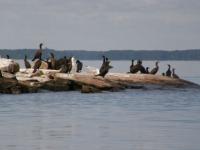
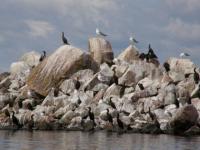

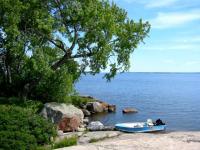
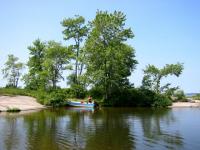
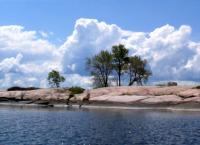
Contents of One Cormorant's Stomach
in General Discussion
Posted · Edited by Jocko
Quotes from:
The Rise of the Double-crested Cormorant on the Great Lakes:
Winning the War Against Contaminants
Environment Canada http://www.on.ec.gc....rmorants-e.html
My comments in bold type.
If the current rate of population growth continues, the Great Lakes cormorant population would increase to more than three-quarters of a million birds by the year 2000. However, this is unlikely to occur. Most animals which colonize new areas show a period of initial, unrestricted growth, just as we have seen with cormorants over the last 10-15 years. Such growth, however, can not be sustained forever.Eventually, the population outstrips its food supply, outgrows its habitat (or nesting areas), or is reduced by disease or predation. When this happens, the cormorant population can be expected to drop in numbers, until it stabilizes itself again.
Cormorants sure aren't going to outgrow their habitat (nesting areas), not with all the thousands of islands that they have to choose from.
Predation – like what, for example?
Disease, yeah, let's wait to see if that happens in populations which have lots of room to spread out.
Outstrip the food supply? Now there's a comforting thought. How much of the food pyramid will be left?
According to fisheries biologists,stocks of the smaller prey fish have been decreasing dramatically in recent years. This decrease in the cormorants' food supply is probably already contributing to their decline on Lake Ontario.
Um, so does that mean that cormorants are the reason for the decline, and that is leading to their own decline? No consolation for the lost resources and environment.
The third concern is not such a clear issue. In northern Georgian Bay, fish harvesters feel that recent declines in local catches of yellow perch and smallmouth bass are the result of increased cormorant numbers at nearby colonies. As evidence they cite the ease with which a "meal" of fish was caught ten years ago, before the birds increased. Now, those fish are scarce and good catches are exceedingly rare. They also state that before cormorant numbers increased one could easily observe, when SCUBA diving, large and frequent schools of perch. These schools, too, have now disappeared.
Fish and wildlife officials do not currently have sufficient data to properly evaluate this problem. It is true that cormorant numbers have increased in northern Georgian Bay during the last decade. Cormorants do eat yellow perch and bass,and if these species were locally abundant, they could form the major part of their diet. The Ontario Ministry of Natural Resources and the Michigan Department of Natural Resources, with input from Environment Canada, are now undertaking a major study of the feeding habits of cormorants in Lake Huron in order to shed more light on this question.
They really only need one piece of data. If the quota-controlled commercial catches were stable before the cormorants burst upon the scene, then 2+2 wouldn't be too hard.
There is also concern about the effect of cormorants on the vegetation in their nesting grounds. Cormorants can damage vegetation by stripping leaves from trees. The combined weight of the birds and their nests can even break branches. But perhaps most importantly, their excrement, which rains down to the ground from their nests, kills the ground vegetation and eventually kills the nest tree. In some cases, the loss of these trees can lead to increased erosion. This is of particular concern on sand spits and barrier beaches which protect interior wetlands. In other areas, the vegetation may be of unusual natural significance, such as the islands in western Lake Erie which are forested by rare stands of Carolinian woodlands. The large cormorant colonies there could seriously impact or even destroy this vegetation.
So there's concern about rare stands of woodlands. I'd like there to be concern about ALL stands of woodlands, especially on islands.
My wife and I travelled through the northern States a couple of years ago. We stopped for gas at a town in North Dakota. The town was built around a nice lake, maybe an 80 to 100 acre lake, and in the middle of the lake was an island that I guess would have been beautiful at one time. All the island had on it was skeletons of trees, with cormorants perched on top. That's what those townsfolk got for not doing anything – an eyesore that will probably still be like that when their kids are grown.